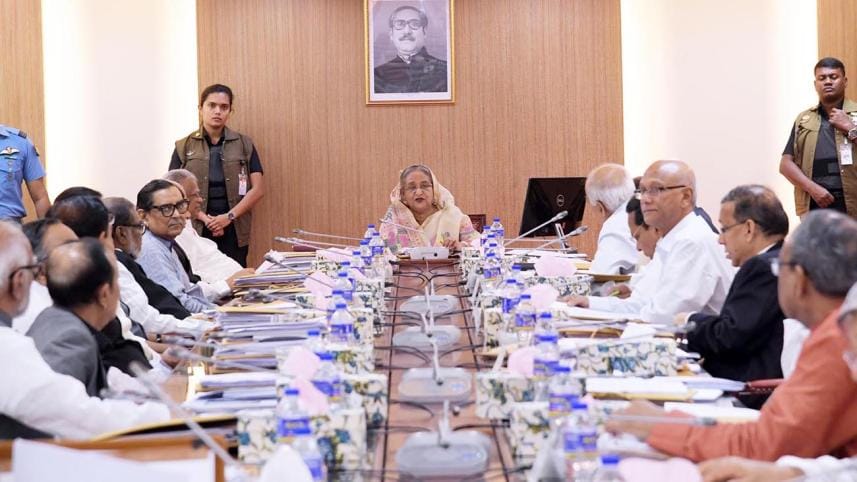Draft broadcast law gets nod

The cabinet yesterday approved proposals seeking to enact a new law to regulate broadcasting media and news portals with provisions for stringent punishments like cancellation of licence and jail terms of up to seven years.
Under the proposed Broadcast Act-2018, if anyone broadcasts false or confusing information in a discussion programme or anything against the spirit and principles of the Liberation War or against the state policy, he or she will face a maximum jail term of three years or a fine Tk 5 crore or both.
Briefing reporters after a cabinet meeting, Cabinet Secretary Shafiul Alam said 24 violations have been defined as crimes under the proposed law. These would be made bailable offences and none would be arrested without an arrest warrant, he added.
The cabinet also okayed another draft law for the journalists, employees, artists and technicians of all newspapers, TV channels, radio stations and online portals to fix their wages and other benefits.
According to the draft of the Broadcast Act, a commission will be formed with the power to issue licences to new broadcasting media outlets and news portals and outline a set of standards for them.
Shafiul said the licence of a broadcasting media house and registration of an online media outlet would be cancelled for seven specific violations of the proposed law.
Of them, six would be related to court and the other would be determined by the proposed commission, he added.
The proposed law stipulates that a licence will be cancelled if the licensee becomes a bank loan defaulter, or is sentenced to two years or more in jail by a court, or declared bankrupt or mentally imbalanced.
The cabinet secretary said if anybody continued broadcast despite being declared disqualified by a court for running the media after being bankrupt, he or she would have to face maximum seven years’ jail term or a fine of Tk 5 crore or both.
The draft law says a seven-member commission will issue licence to TV channels, radio stations and cable operators following recommendations of the government. The broadcasting media outlets will have to renew their licences every five year by paying a specific fee.
Similarly, news portals must be registered with the commission.
The chairman and other commissioners will be picked through forming a search committee. They will be appointed for five years after an approval by the president. The maximum age of the commission members will be 70, the proposed law says.
The members of the commission must have 15 years' experience in various areas concerned, including knowledge on digital tools and techniques.
The proposed law has a provision for lodging complaints with the commission which will be resolved following the Alternative Dispute Resolution system.
The cabinet secretary said there would be complaint centres under the commission. Any consumer aggrieved at the content of a media outlet would be able to lodge a complaint.
MASS MEDIA EMPLOYEES ACT
The cabinet approved the draft of the proposed Mass Media Employees (services and conditions) Act-2018.
Cabinet Secretary Shafiul said the wages and benefits of journalists, employees and press workers, artists of broadcast, online, and print media outlets would be fixed under the proposed law.
Once the new law is passed in parliament, jobs of media employees will no longer be regulated under the labour law, he added.
Currently, journalists and employees of media houses are regarded as “workers” under the labour law.
“Once the law is passed, they will be regarded as media personnel, not workers,” Shafiul said.
According to the proposed law, a wage board will be formed for the media personnel. There will be an inspection committee under the wage board. On the basis of inspections by the committee, each media house will formulate a service rule of its own in line with the proposed law.
The wage board will fix salaries and allowances of media personnel in line with the salary scale of the government employees and it will be applicable to the owners of all media outlets.
Every media house will have a provident fund which will be applicable to a new employee after one year in service instead of two years. An employee will contribute 8 to 10 percent of his basic salary, currently 7 percent, and an equal amount will be deposited in the fund by the owner of the media house, the proposed law states.
The weekly working hour of the media personnel will be brought down to 36 hours from 48 hours. If anybody works beyond the stipulated time, he or she will be entitled to overtime pay.
The proposed law says a media employee will enjoy 15 days of casual leave every year instead of 10 days. For a female employee, the maternity leave will be six months.
Violators of the law will be punished with fines ranging from Tk 50,000 to Tk 5 lakh. The government can shut down the media outlet concerned and suspend its various privileges for committing an offence, adds the proposed law.



 For all latest news, follow The Daily Star's Google News channel.
For all latest news, follow The Daily Star's Google News channel.
Comments